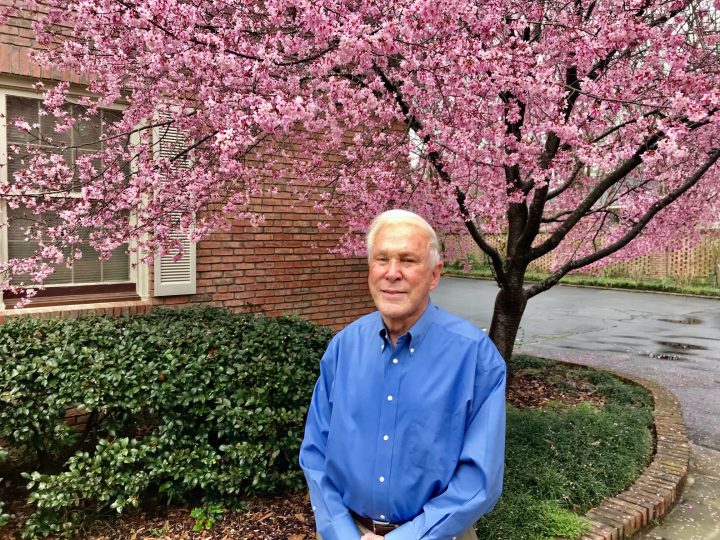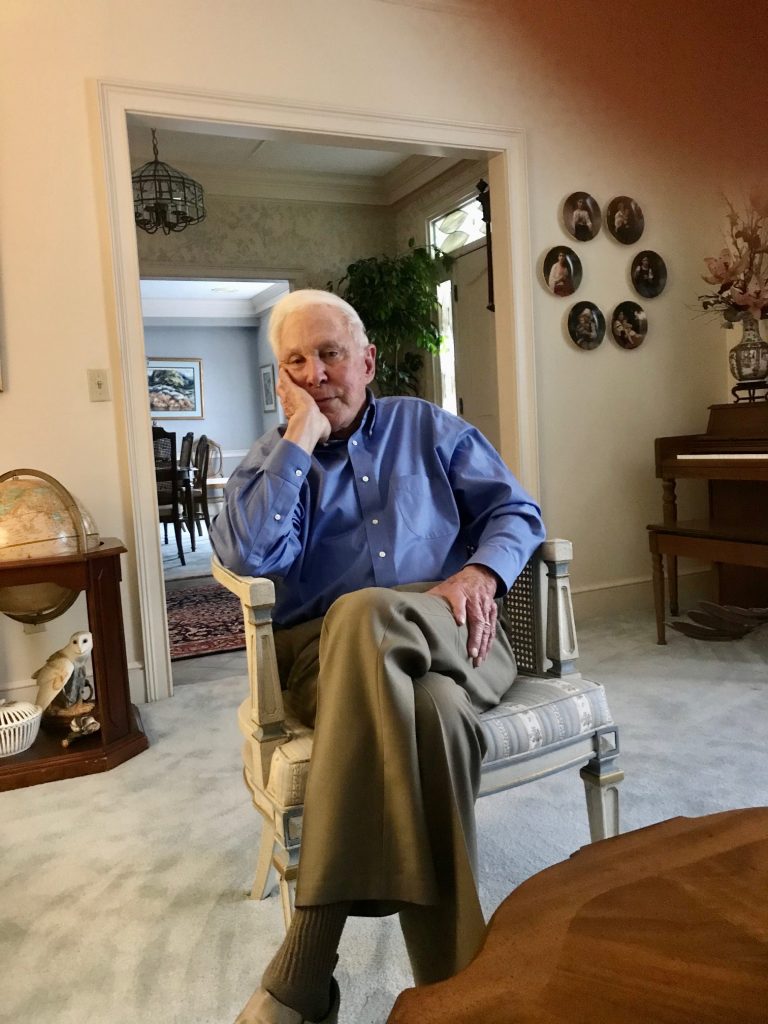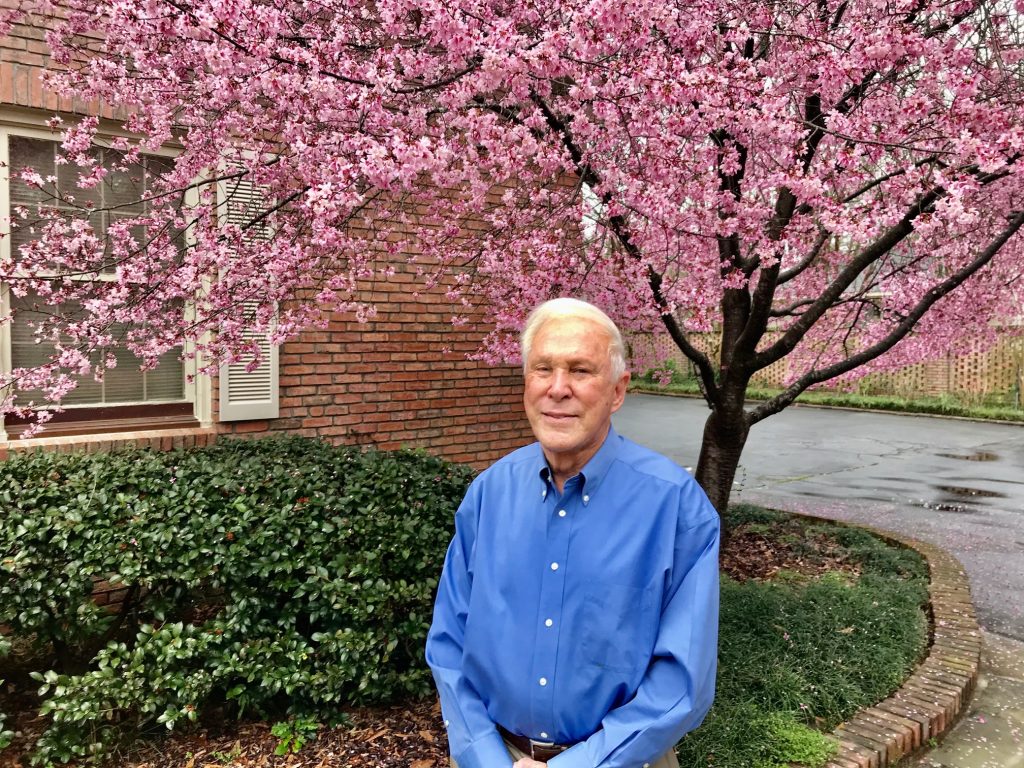
Real Estate Developer, Writer, Literary Philanthropist
You have stated that, with the endowment that you established at Columbus State, your wish is to do for the literary arts what the university has done for visual arts and performing arts in recent years. How do you see that vision taking shape?
“Actually, I was planning to do something like this half my life, once I could afford to do it. I didn’t know that CSU would be my outlet until it was suggested to me.
The endowment is broken down into three parts:
One, to fund a faculty chair, a position that manages and coordinates all the various concerns that come with the endowment.
Two, to award a literary prize nationwide. The prize [$10,000] is one of largest in Columbus. Also, it’s the first of its kind. There are many literary prizes but mine is the only that gives parameters which the good writing has to fall under. In other words, we have a mission and our mission is to encourage and promote writing that honors traditional values of responsibility, gratitude, generosity, love, and faith.
Good writing comes first, but it has to meet one of those moral factors, whether it be poetry, fiction, or nonfiction. In our first year, we received over 220 manuscripts, some coming as far away as Australia. Hardly any came from Columbus.
The third aspect is to support 10 or more CSU creative-writing students to go to an undeveloped country and do mission work, then come back and write about it. The values we take for granted can be used to enhance the spiritual lives of people who have to walk 20 miles to get a drink of water. That part might impact Columbus more than the literary prize, because they have to come back here and write about it. It’s an experimental idea.
We’re so supportive of arts, like what we have in the Bo Bartlett Center, but we don’t think much of the writers around here. We have some good writers around Columbus.”
Part of the endowment also creates at CSU an imprint , D.L. Books.
“I really wanted to start a small publishing house. Most colleges have one. Mercer, UAB, etc. It will become a regular trade publishing house. I will fund that and would like to see it succeed.
I’m counting on doing something that will survive me and my life and that will be a significant legacy — not only for my children and grandchildren but also for the entire community, .and even nation.
When I started off writing, I was very poor. I had to make some money and had to give up writing to do that. That’s why I want to give the opportunity for others to win the Pulitzer Prize 10 years, 20 years from now.”
What’s your take on the local literary tradition? St. Elmo, Nunnally Johnson, Carson McCullers …
“McCullers is by far the most well known. She was a genius. You don’t come across a true genius very often. It’s a shame she died so young.
Now that [CSU creative writing professor] Nick Norwood is involved as director of the McCullers Center [for Writers and Musicians], McCullers local legacy has improved. I’d say it has a fair cultural effect. Whether it’s had an effect on the literary world, I don’t know.”
Carson McCullers is celebrated in Columbus now, but at one point she was vilified by some in the community.
“She was vilified. And I can see some aspects of her and her work that deserved vilification.
However, most scholars place The Heart Is a Lonely Hunter among the top 100 books ever written. Scholars extend the same kind of respect for the works of William Faulkner. But I don’t much care for either’s books.
As a writer, you strive to write so the reader will understand what you’re saying. These guys are hard to understand.”
What do you think is a writer’s responsibility when documenting their hometown in a work of fiction?
“For the first decades of my writing, I didn’t want to be known as a Southern writer. Thought it was a stigma. But Southern writers now rank among the most respected writers in the world.
I read one time where you could put your thumb on Montgomery, Alabama, and draw a 300 mile circle around it and there you will find the best writers this country has ever produced. I have the idea there’s a lot of truth to that.
I’ve started writing about Columbus. My books now are set in Columbus. It’s the locale for Happy Lightning — which very few people read, even though I thought it was a god book. Negative Space, published last year, uses Columbus as its locale.
Columbus has a rich cultural history. The Springer was well known back in its day. They had actors and musicians coming into Columbus from Europe 200 years ago. I would think there’s a lot of material out there to write about in this town.”

In Negative Space, how much does Columbus inhabit the story?
“It’s not a big factor. The main characters — there are 4 semi-protagonists — they go and pick up their nephews and bring them back to Columbus to help raise them. Columbus is the location but they don’t talk about it much at all.”
Dumping a body in the river is pretty Southern Gothic.
“I do mention the river. One of the big scenes is on the Riverwalk. But it’s not about that as such.”
Why do you think your writing career is kicking into high gear when you’re in your 80s?
“The fact that I was determined not to be published by small presses. I wanted to hit it big in New York. I wanted to be one of the blockbuster big sellers.
All these books of mine that are coming out now were written 15, 20 years ago, published by small presses. The small presses are the way we’re going to have to go. The only voices the big publishing houses in New York are only going to find are new writers that represent different ethnic groups. Vietnamese writers have a better chance of finding a publisher now, because that’s the trend, publishing the voices of the minorities, of the underdog. That’s the trend all across media. Nothing you and I would write would make it big now.
I’m satisfied now if anybody wants to publish it and it only sells 100 copies. My book that came out last fall, Fearfully and Wonderfully Made, was published by Negative Capability Press. It’s very prestigious, having won a lot of awards.”’
How did it feel writing about Columbus?
“It felt pretty comfortable. Another novel I’m working on is centered around Columbus and has a good bit of Columbus culture and history in it. It’s about a boy that attends Wynnton School.
I’ve decided to write about Columbus more and not be concerned with being labeled as a Southern writer. For one thing, a writer should know his subject well. Number two, he should know 90% more than he puts down on paper.The only way you do that is through extremely time-consuming research, or writing about your own environment.”
at his Midtown Columbus, Georgia home. 2.6.2020
Age: “I don’t want to talk about age. And let me tell you why. Age is just an idiosyncratic tendency people have. I don’t think age has anything to do with character. That’s what I look at — character. I don’t look at any of that extraneous stuff.”
Education: “I took family on at age 16. My dad got sick with cancer and I had to leave Columbus High and start a business to support a family. I managed to work, make a living, and write at night. I had two years of University of Georgia, which had a Columbus College campus then, so I did get a couple years of college in that way. I left, frankly, because I knew more than my professors.”
Professional background: “I’m self-taught. I taught myself everything I know. Never worked for anybody. Started putting up chain-link fences, which is a very difficult job, and moved ingo remodeling. Got pretty good at that, taught myself how to read plans, then started to bid on buildings.
I competed with guys straight out of Georgia Tech. I didn’t have that background. It took me about 15 years to make some money. But I survived them all and probably ended up with as much money as most of them.
With writing, I never had any formal training. I wish I had.”
Family: Wife Sara Ayers Jordan passed away in 2018. Daughter Jenni Jordan Foster has 4 children. Daughter Karen Hopkins, inherited from wife’s previous marriage, married to Kenny Hopkins, has 3 daughters.
Church: “I got to First Baptist now. But I joined Wynnton Baptist when I was 8 years old. I moved with it out to Wynnbrook, stayed there until about 3 years ago, when I moved to First Baptist. Rev. Jimmy Elder and I have a special thing because we can talk along the same lines.”
Favorite book: A Tale of Two Cities
Favorite writer: Charles Dickens (“Of course, nobody can discount Mark Twain.”)
Favorite meal:Lobster
Favorite Columbus landmark: Architecture of Historic District houses
Who inspires you: “My daughter, Jenni. She and Jimmy Elder. She’s my strength. Since her mother died, she’s been here every single day, except when she’s out of town. She fixes things, talks to me.
I‘m a Christian and think every man has a purpose. I thought my purpose was to be a writer, to be a voice, a voice that makes folks laugh and cry. I get down about it because that purpose hasn’t been fulfilled. Jenni tells me, ‘God called you to be a writer but he hasn’t necessarily called you to be a best-selling writer.’
I grew up really poor. I saw my mother cry over paying bills. I ought to be really miserly. Hang on to everything because I know what it’s like to not have anything. But I went the other way. I decided money won’t buy happiness, won’t buy love, What it will buy is helping other people. My theology of life is to do whatever you can to help somebody in need.That’s what I do with my money.”

